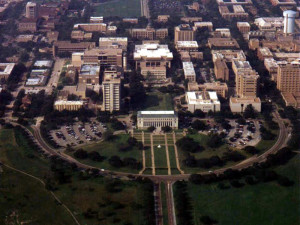My wife, who spent her formative years in College Station TX, asked me “why don’t Aggies eat barbecue beans?” Answer: “Because they keep falling through the holes in the grill.”
That’s not nice at all! And, most likely, not even true! Although I can’t be sure because I’ve only visited College Station myself a few times.
Aggie jokes popped into my mind because CardHub.com, an online aggregator of credit card information, published a mildly interesting report this past week ranking US cities in terms of their average expected time to pay off credit card debt.
 The Ranking
The Ranking
Aggies, brace yourselves. College Station ranked 2,547 out of 2,547 cities. That’s dead last in the entire country in terms of capacity to pay off credit card balances in a timely way. Ugh.
It got me thinking about how the home of a distinguised research institution would have the ignominious distinction of being last in the country in terms of credit card debt sustainability.
By contrast, CardHub lists the city with the #1 ranked fastest time-to-payoff credit card debt as Cupertino, CA.
Methodology
CardHub’s method for rankings went as follows. They figured out average income per household in each of 2,547 cities, according to the US Census, as well as the average credit card balance in each city, as provided by credit bureau TransUnion.
CardHub assumed a 14% annual percentage rate on balances – and then assumed an affordable payment of existing balances each month, adjusted for average income in the city.
Using that data, CardHub calculated how many months – on average – it would take the residents of a city to pay off their credit card debt.
I describe their report as only “mildly interesting” because while it purports to show something novel about average indebtedness by municipality, it’s actually an interesting example of how financial statistics may mislead and just reflect demographics.
 Is it just wealth?
Is it just wealth?
Cupertino, CA – the #1 ranked city in the CardHub study – is an address which you may recognize as the home of Apple, the world’s most valuable company.
Of the top 10 cities ranked by time-to-payoff – all but one are in tech-rich California cities or affluent suburban-Boston cities of Massachusetts such as Lexington or Arlington. Of the top 30 cities, many others are recognizably wealthy suburbs, including Bloomfield Hills, MI, McLean, VA, and Chevy Chase, MD.
So I guess one way to look at these rankings is just to notice that residents of high-income and wealthy cities can pay off their debts more easily while residents of poorer cities – by definition – will take longer to pay off their debts. That’s sort of obvious, and also not very funny at all.
Another Aggie joke
But did you hear the one about the Aggie who won the Texas lottery but was told he’d have to receive the money in 20 yearly installments instead of a lump sum? He was so angry! “In that case,” he said, “just give me my dollar back!”
Ok, that isn’t nice at all, either. Also, seriously, you should never play the lottery.
Or another factor?
Besides the high income and wealth factor, which I think is sort of obvious (and again, not that funny) I was wracking my brain to figure out how a college town in Texas ranks dead last nationwide in terms of time-to-pay-off credit card debt.
The best I came up with is that a plurality of the population of College Station, TX is actually students – who naturally earn practically nothing – but who do incur credit card debt in the ordinary course of their studies.
I’m pretty sure my theory is correct. According to the US Census the median age of a College Station resident is 22.3 years, compared to the median age in the United States of 37.2. Furthermore, the population of College Station in 2010 was about 94,000, while Texas A&M reported a student population that year of about 49,000. So I think what CardHub’s time-to-payoff credit card rankings really highlight – at least at the bottom – is a population of students, in their debt-incurring phase of life, rather than their earnings phase of life.
College Students
Supporting my theory about the preponderance of a student population of a city is the fact that other cities ranking in the bottom of CardHub’s list of 2,547 include other college towns like San Marcos, TX (#2,532 and the home of Texas State University) and Provo, UT (#2,531 and the home of Brigham Young University).
So, I’ve come to believe, Aggies and College Station TX can’t be razzed for ranking dead last in the country on this measure. It’s just a demographic anomaly of a student-dominated city population. I spoke to Jill Gonzalez, an analyst at CardHub, who seconded my analysis, and named for me some other prominent college towns that ended up on the bottom of the list.
 A third Aggie joke
A third Aggie joke
Meanwhile, my father-in-law, a long-time Texas A&M professor and Aggie booster, sent me a link to Aggie jokes online, and I appreciated the one about what Aggies think Cheerios are: Donut seeds.
I like that one. Personally, I will never see Cheerios the same way again.
The actual point
Ok, the (semi) serious point of looking at a financial ranking like “time to payoff credit card debt” is that statistical financial rankings like this can often obscure reality. CardHub’s ranking of cities may be interpreted as a demographic ranking of wealthy cities at the top and college towns at the bottom.
Very likely the Aggies of College Station, TX aren’t worse at handling credit card debt than the rest of the country. They’re just students who haven’t begun to register any income yet.
Still, it’s tempting to make a make a few jokes, no? I’ll probably be run out of town for this post.
Editors Note: To avoid hate-mail from Texas A&M boosters, I’ve decided to remain anonymous, except for the fact that a version of this ran in the San Antonio Express News.
Post read (401) times.




